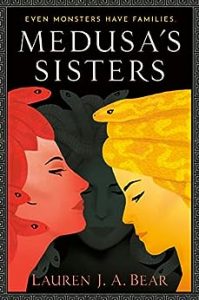The Year in Review 2023 by Alexandra Pierce

2023 by Alexandra Pierce
2023 was a really good year for books! I’m going to focus on the books I loved that were written by women and nonbinary folk.
SEQUELS
It was a pretty good year for sequels. I would be a paid-up member of the Murderbot fanclub if one existed (let me know if I’ve missed that memo), so Martha Wells’s System Collapse was a welcome end-of-year addition to Murderbot’s story. Also out in space was Mur Lafferty’s Chaos Terminal, the second in the Midsolar Murders series; this glorious mash-up of detective story/space opera continues to be an immensely enjoyable series. I hope everyone else agrees and we get more, because there are so many potential opportunities for murder most foul on a sentient space station inhabited by a variety of species. Back on Earth and back in time was Shelley Parker-Chan’s He Who Drowned the World, the final installment in their duology; it was as tense, horrific, emotional, and epic as it needed to be, and I’m going to be ruminating on the characters and their motivations for some time. Finally, I can’t forget that 2023 also brought me a new Ann Leckie novel: Translation State isn’t exactly a sequel, but it’s not exactly not, either, since it definitely fits in with the previous Radch novels (there’s even a cameo from previous novels!).
I don’t know whether it was my particular bent this year, or if there was a surprisingly large amount of it published, but I read a lot of really good mythological retellings. Claire North continues to make me exceptionally happy that she has taken on Greek mythology with her Songs of Penelope series, reworking the Odysseus and Atreides sagas and making something remarkably new out of very old cloth. House of Odysseus is different from the first book (Ithaca, 2022) because its narrator is Aphrodite rather than Hera; but the focus on women’s actions, and the sly interpretation of the source material, continues to delight. Also leaning into the heroic mythology was Phoenicia Rogerson, whose Herc told the story of Hercules without ever allowing the man to speak for himself. It’s a clever and innovative way of exploring a story that I really thought was too hackneyed to be done again. Still in the Greek myths but moving to the nonhuman, there was Lauren J.A. Bear, who explored the lesser-known Gorgons in Medusa’s Sisters – like Rogerson, using minor characters to explore well-known stories, placing Medusa’s experiences in a much wider and richer context than many other stories manage. And then there was Psyche and Eros: also a perennial story and one that I didn’t think would get another good retelling any time soon; happily, Luna McNamara proved me wrong.
COLLECTIONS
I read two excellent and completely different collections from women this year. Octavia Cade’s You are My Sunshine and Other Stories is a wild ride from melting ice caps and terrible Australian bushfires at the start, through various apocalyptic visions of the impact of climate change, to – eventually – some surprisingly hopeful visions of humans living with the continuing impact of climate change. For stories that were written across several years, they fit together very well; it’s not a mosaic novel, but it hangs together as a complete collection better than many others. And then there was E. Lily Yu’s Jewel Box: a perfectly named collection, because every piece was exactly its own thing, and every piece was exquisite; they shine separately, but together they create something greater than their parts.
OTHER
Finally, three books that don’t fit into these categories, are completely different from one another, and that absolutely make my best-of for the year. Emma Mieko Candon’s The Archive Undying had me occasionally wondering if I could manage to keep up with the frenetic pace that the narrative set. Overall, yes I could, and I hadn’t expected to enjoy an AI and mecha story quite so much. On a different axis entirely is Malka Older’s take on Sherlock Holmes: The Mimicking of Known Successes is a far-future sapphic romance, with humans having fled Earth and now living around Jupiter. Older mimics Victorian England, with an emphasis on tea and scones and the gas of Jupiter bringing the fug of London’s smog; as with Lafferty’s Midsolar Murders, the combination of space and crime is a winning one. There’s at least one more Mossa and Pleiti story (The Imposition of Unnecessary Obstacles, 2024) and I’ve got my fingers crossed for more. And then, finally, there’s Emily Tesh’s debut novel Some Desperate Glory. It’s easily in my top five books for the year. There’s so much going on in this novel, it’s hard to know where to start. Compelling characters and believable relationships, sure, and anyone with an annoying sibling is going to feel seen. But it’s really all about the slow-burn reveal of what is actually going on in the galaxy, beyond the narrow human-centric view that the warrior Kyr has been brought up with; it’s the dangers of isolation, the lure of bitter vengefulness, the mesmerizing nature of a narrow worldview. I cannot wait to see what else Tesh produces.
(Also, a shoutout to Nicola Griffith’s Ammonite (1992) and Claire North’s 84K (2018), both of which I finally read this year. I’m embarrassed it took so long to get there, but on the upside, I finally got to experience them both!)
Alexandra Pierce reads, writes, podcasts, cooks and knits; she’s Australian and a feminist. She was a host of the Hugo Award winning podcast Galactic Suburbia for a decade; her new podcast is all about indie bookshops and is called Paper Defiance. Alex has edited two award-winning non-fiction anthologies, Letters to Tiptree and Luminscent Threads: Connections to Octavia E Butler. She reviews a wide range of books at www.randomalex.net.
This review and more like it in the February 2024 issue of Locus.
 While you are here, please take a moment to support Locus with a one-time or recurring donation. We rely on reader donations to keep the magazine and site going, and would like to keep the site paywall free, but WE NEED YOUR FINANCIAL SUPPORT to continue quality coverage of the science fiction and fantasy field.
While you are here, please take a moment to support Locus with a one-time or recurring donation. We rely on reader donations to keep the magazine and site going, and would like to keep the site paywall free, but WE NEED YOUR FINANCIAL SUPPORT to continue quality coverage of the science fiction and fantasy field.
©Locus Magazine. Copyrighted material may not be republished without permission of LSFF.









